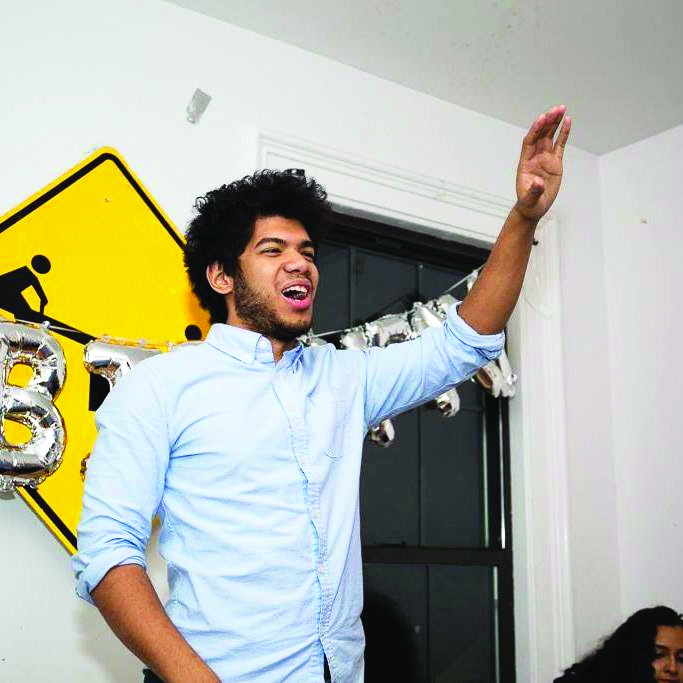
Courtesy of Branson Rideaux
After the 2016 election of President Donald Trump, Branson Rideaux ’20 stood shirtless in front of what was then called Calhoun College. He wore a costume metal chain and a sign that read “Property of John C. Calhoun & 56,682,202+ American Voters” — a statement that gained national attention.
“I was just really, really mad,” Rideaux explained over two years later. “I identified as black and I identified as Phillipino, but I grew up knowing that I was American. That was what my family thought was important, that I was American. The biggest shock for me was that there were all these people in America that did not actually care about me or about black people, who are still just incredibly racist.”
As the former president of the Yale Dramatic Association — commonly referred to as the Dramat — Rideaux had no intention of pursuing either performance art or theater in college before he came to Yale.
Rideaux grew up in Berwyn, Illinois — a town outside of Chicago that, according to Rideaux, used to be “really racist.” Yet, by the time his family moved to Berwyn, the community was primarily Latinx and low income. Rideaux’s father grew up on the west side of Chicago, his mother in the Philippines. His mother moved to Chicago as a teenager and the two met in high school.
Rideaux is the youngest of four children. He followed in his three older sisters’ footsteps toward the arts, beginning with dramatic reading competitions in middle school. Rideaux acted in his first play as a freshman in high school. He played football and swam competitively, but by senior year, had prioritized his commitment to the arts.
But, Rideaux was determined to leave his performing past behind him in college. He entered Yale as a Chemical Engineering major enrolled in Directed Studies. “I’m gonna be a chemical engineer,” he recalled thinking. “I’m gonna focus on life and be cool. Maybe I’ll join a frat.”
Rideaux decided against chemical engineering within three days of his arrival at Yale. Still, he remained hesitant to participate in theater. A “Pancakes with the Dramat” recruitment event changed his mind.
“I remember walking in and seeing the president of the Dramat just flipping pancakes in a Dramat shirt, and thinking that’s who I want to be,” Rideaux said.
Rideaux acted in the Dramat’s Spring Mainstage — “We are Proud to Present a Presentation about the Herero of Namibia, Formerly Known as South West Africa, From the German Südwestafrika, Between the Years 1884–1915” — during his first year at Yale. Rideaux said that the play was his favorite to work on despite its heavy material: he played a character who was hanged as part of the production.
After performing in six shows his first year, Rideaux reexamined his participation in theater at Yale and determined to “either drop the Dramat or become president of the Dramat” during the fall of his sophomore year. He explained that he was frustrated by the Dramat’s handling of sensitive issues, especially in its Fall mainstage production, “Dreamgirls.”
“Dreamgirls was exactly how you don’t do responsible theater,” Rideaux said. “It was a show about black people, but a lot of the creating forces behind it were white. They didn’t really have a lot of care towards the actors and creators. People found it to be a really exhausting experience, and it really didn’t engage with the community the way that it should have.”
Rideaux wanted the Dramat’s next season to go differently, so he decided to take charge. He described his approach to responsible theater: “How do we make sure that it’s not just that we have the bodies in the room, but that the bodies in the room are being taken care of and are being supported and are feeling like this is a place they can belong?”
With his year as president behind him, Rideaux said that he is proud of what he accomplished with the Dramat. In an effort to create more responsible theater, he met with each Dramat director before the casting process to discuss issues of representation, inclusion and access. He noted that eight of the ten members of the Dramat executive board are black this year and that the group has increased communication and collaboration with cultural centers on campus. Rideaux himself met with each cultural center dean in an effort to encourage engagement. Still, he noted, “Looking back, I could have done way more.”
Rideaux hopes to take the experiences and lessons he learned from the Dramat into the professional theater world. He is an African American Studies major and is part of the Multidisciplinary Academic Program in Human Rights. After graduation, Rideaux wants to “create theater” in some capacity — by producing, writing or acting. He is also considering pursuing an MFA in Black Performance Studies.
Lindsay Daugherty | lindsay.daugherty@yale.edu
Correction: A previous version of this article quoted Rideaux as saying “I identified as black and I identified as Latino.” In fact, he said “I identified as black and I identified as Phillipino.







